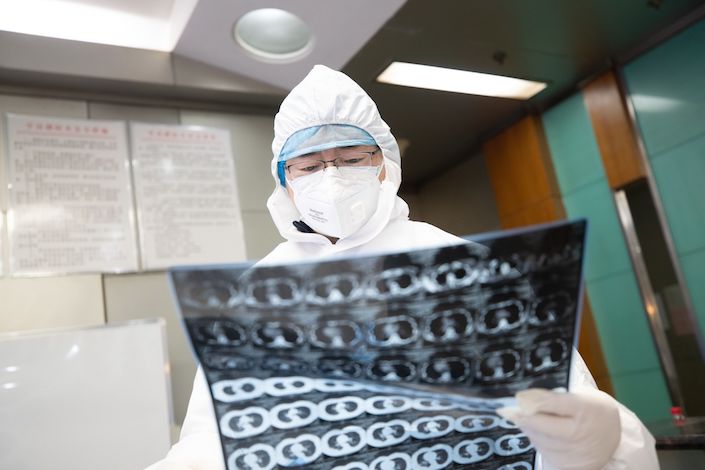Covid-19 Patient Dies Days After Being Declared Recovered

 |
A 36-year-old man died of Covid-19 just five days after being declared recovered from the disease and discharged from a hospital, raising fresh questions about the risk of recurrence and the criteria used by hospitals to define recovery.
The patient, Li Liang, died Monday during post-recovery quarantine at a designated hotel in Wuhan, the epicenter of the outbreak. He was supposed to be fully released March 10 after 14 days of further observation.
But Li started feeling sick again two days after he was discharged from the hospital and moved into the quarantine hotel, according to Li’s wife Wang Mei (a pseudonym). His condition deteriorated suddenly Monday, and he died in the afternoon. Doctors attributed his death to Covid-19, respiratory tract obstruction and respiratory failure.
It is unclear whether Li died after a recurrence of the disease. But his death fueled concerns over whether the current diagnosis criteria are accurate enough for determining Covid-19 patients’ recovery. The case also followed reports that a number of recovered patients across China later tested positive again, raising puzzling questions whether such patients could still be infectious.
Read more
Caixin’s coverage of the new coronavirus
Under the current national treatment plan, patients can be declared recovered if their body temperature remains normal for more than three days and if they display clear improvements in respiratory symptoms, show recovery from lung infections in CT scans, and more importantly, test negative on two consecutive nucleic acid tests.
When Li was declared recovered, he met the official diagnostic standard of recovery and had twice tested negative for the virus. But two days before his discharge, CT scans of his lungs still showed symptoms of viral pneumonia. Some medical experts suggested Li may have been released too soon.
“How can he be allowed to leave the hospital just two days after CT scans still showed typical coronavirus pneumonia symptoms?” asked an expert from the Chinese Center for Disease Control and Prevention who spoke to Caixin on condition of anonymity.
Yang Xinghai, director of Hanyang Guobo Fangcang Hospital, where Li was hospitalized, said the hospital suspended discharging recovered patients on authorities’ orders.
“We are not the only hospital stopped,” Fang said.
Unexpected death
Wang last talked to her husband Monday morning by phone when Li said he was not feeling well and his body temperature showed only 35.3 degrees Celsius, below the body’s normal temperature of 37 degrees Celsius. Wang told Li to put on socks and stay warm. An on-site doctor said Li was probably stressed.
But five hours later, Wang received a call from the quarantine hotel asking her to visit. As she arrived at the hotel, Wang found Li lying fragile in bed. Li was later sent to a nearby hospital by ambulance and soon declared dead.
It was just five days after Li cheerfully shared his success in fighting off Covid-19 with his friends and family after leaving the hospital Feb. 26.
Li, a physical therapist, tested positive for the novel coronavirus Feb. 9 after showing symptoms. On Feb.12, he was admitted by the Hanyang Guobo Fangcang Hospital, one of the makeshift hospitals built to treat patients with mild and moderate symptoms.
According to Wang, Li received traditional Chinese medicine treatments in the hospital and showed obvious improvement. Two virus tests on Li’s swabs Feb. 20 and 23 showed negative results. But a CT scan Feb. 23 indicated that there was still infection in his lungs.
On Feb. 25, the hospital decided that Li had met the recovery standards based on expert assessments and could be discharged the next day. Li was then transferred to the quarantine hospital for post-recovery observation under current rules.
But some experts questioned whether Li’s remaining lung infection was overlooked in the hospital’s decision. A Wuhan doctor said, “CT scans often play a minor role” in some hospitals’ determination of recovery.
Hospital director Yang said the hospital applies stricter standards compared with the national criteria to judge patients’ recovery.
“Whether a patient can be released needs to be approved by different levels of doctors and experts,” Yang said.
Wang said Li continued taking medicines after moving to the hotel. On Feb. 28, Li said his mouth felt dry. A doctor said it was most likely due to the medicine he took and suggested he drink more water.
On March 1, Li told Wang he didn’t have an appetite for food or water and always felt sleepy. The next day, Li’s condition deteriorated.
Similar cases have been recorded in other places. On Feb. 27, an 80-year-old patient died after being reported recovered in Shanxi province. Local health officials said the patient recovered from Covid-19 after receiving plasma therapy but remained in a hospital for other underlying health issues.
An intensive care doctor told Caixin that many Covid-19 patients showed complicated conditions and returned to critical illness after virus tests came back negative. He suggested that hospitals enhance monitoring and management of recovered patients even after they are discharged.
Another Wuhan doctor said his hospital also encountered deaths of recovered Covid-19 patients. Although there is no conclusion on whether death was directly caused by the disease, there is great value in studying such cases, the doctor said.
Amid rising concerns over the accuracy of nucleic acid tests as the key measurement for diagnosing Covid-19, some experts suggested adding antibody tests to detect infection. On March 3, another makeshift hospital in Wuhan announced the start of testing patient antibodies in blood before they could be discharged.
Contact reporter Han Wei (weihan@caixin.com) and editor Bob Simison (bobsimison@caixin.com)








